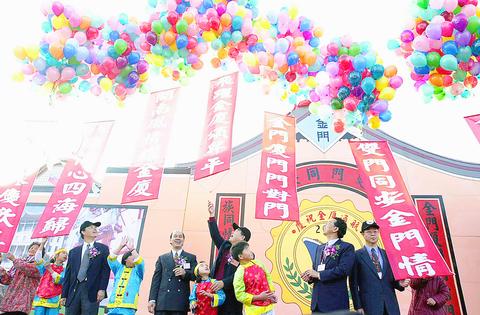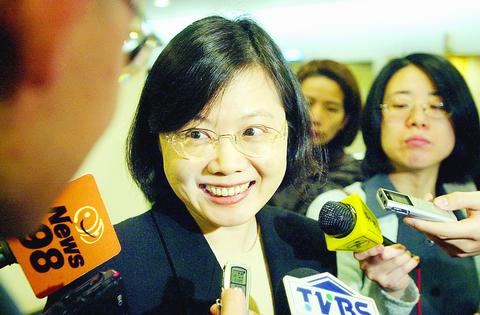In the run-up to the presidential election last year, Beijing threatened to unleash the full force of the People's Liberation Army and rain missiles down on Taiwan if the DPP won office. Critics at home echoed the theme that China would attack Taiwan should the pro-independence party come to power.
President Chen Shui-bian (

In keeping with his campaign promise, Chen has sought hard to preserve peace in the Taiwan Strait. To that end, he has made a series of concessions including promises not to declare Taiwan independence nor tinker with the nation's flag nor national anthem. This centrist tilt has earned the president applause both at home and abroad.

To further demonstrate his goodwill, Chen floated the idea of "integration" between both sides of the Strait in his New Year's Eve speech. The next day, the so-called "small three links" (
This and other overtures, however, have all failed to move Beijing, which insists Chen accept the "one China" principle before seeking to mend fences. Chen and the DPP are unwilling to concede this point, however. With no solution in sight, the two sides will most likely remain in what analysts refer to as a state of "cold war" until after the December elections when Taiwan's political map is expected to undergo a substantial change.
The fact that the US might intervene on Taiwan's behalf in the event of hostilities breaking out has also been a stabilizing factor. Last month, US President George W. Bush said the US would do "whatever it takes" to defend Taiwan and "the Chinese must understand that." The statement stands in stark contrast to US policy toward Taiwan since Washington switched diplomatic recognition from Taipei to Beijing at the end of 1978.
On the campaign trail, Chen vowed to emulate late US president Richard Nixon, who had been a staunch opponent of communism but who managed to bridge the gap between the US and communist-ruled China. If elected, Chen said he would visit China, talk with its leaders about any issue and lift the ban on full-scale exchanges. To date, he has yet to make good on the pledge, due mainly to Beijing, which has ignored his administration and wooed the opposition instead.
"Given the predicament Chen is in, he has done a better-than-expected job at guarding the nation's security," said Andy Chang (張五岳), a China watcher at Tamkang University. "The past 12 months have seen no deterioration in cross-strait relations."
Capturing the presidency with less than 40 percent of the vote, Chen has avoided confronting the opposition parties, which together control a two-thirds majority in the legislature. He stepped back from the frontline and asked popular Academia Sinica President Lee Yuan-tseh (李遠哲) to head a task force on cross-strait relations. The panel, with members from across the political spectrum, was charged with building a consensus on cross-strait issues among a politically polarized populace.
Unfortunately, the KMT and People First Party (PFP) refused to participate in the undertaking, as did the miniscule New Party. Their boycott has seriously undermined the task force.
"By attending the forum, the opposition parties would be seen as backing the DPP platform," noted Lin Yu-fang (林郁方), a pro-PFP academic.
Instead, they have urged Chen to convene the National Unification Council whose platform calls for eventual unification between Taiwan and China under a democratic framework.
While willing to leave the body intact, Chen has shunned its helm, standing by the DPP's position that the 23 million people of Taiwan have the final say on the nation's future.
Those attending the forum also disagreed amongst themselves as to the best course of action to recommend. Some favor more pragmatism in dealing with China; others frown on such an approach. After four meetings, the panel hammered out its first and only piece of advice on Nov. 26 of last year known as "the three understandings and four recommendations." It vaguely suggested Chen take cues from the Constitution when addressing the sovereignty feud and revamp existing institutes or set up a new mechanism to guide the cross-strait policy-making process.
The task force has since slipped into a state of abeyance. "The panel is dead whether its members admit it or not," observed Chang Lin-chen (張麟徵), a political science analyst at National Taiwan University.
Jan. 1 marked a new era in cross-strait relations when the Chen administration opened the small three links as an intermediate stage to inaugurating full direct links between the two sides. The following day, a boat carrying 192 officials and journalists from Taiwan made its way from the frontline island of Kinmen to the mainland, the first direct legal crossing between the two sides for more than half a century. Another ship carried 507 Matsu residents to the port of Mawei, near the city of Fuzhou. These travelers crossed the sea on the first leg of a pilgrimage to the Tienhou Temple on Meizhou island just off the coast of Fujian Province.
"The links are a breakthrough in the pursuit of more active ties across the Strait," said KMT lawmaker Chen Ching-pao (
In reality, however, the small three links only served to legalize exchanges that were already taking place. Only 1.6km separate Kinmen and Xiamen. Taiwanese boats regularly pull into Kinmen's fishing ports with coolers full of fish bought on the cheap from Chinese fishermen. Chinese smugglers have long set up "sell-and-run" rendezvous with their Kinmen customers. The partial links serve to decriminalize such activities.
Again, China has not been much impressed. It criticized the links as inadequate and said it would not dance to Taiwan's tune.
Up to May 8, a total of 37 voyages have been made by 3,000 people from Taiwan to China, whereas only 161 Chinese have bothered to cash in on the direct crossing.
Although official communication channels remain shut, private exchanges and contacts at the local level have long existed on both sides. Substantial trade ties have developed over the years, and Taiwan investors have pumped more than US$50 billion -- at conservative estimates -- into China. Most of these businessmen get to their factories in China via Hong Kong or Macau.
Indeed, trade envoys from both Taiwan and China will have to sit at the same negotiating table sooner or later once the two sides enter the WTO.
In a recent TV interview, US President George W. Bush said the US would do "whatever it takes to help Taiwan defend herself." Just days earlier, the White House approved an arms sale package to Taiwan. This series of developments have been seen in Taiwan as unmistakable signs of a greater US commitment to uphold peace in the region. The US has concluded it is necessary to check China before it is too late, analysts note.
The mid-air collision between a US reconnaissance plane and a Chinese fighter jet on April 1 marked a turning point in Sino-US-Taiwan ties, said Johan Chiu (
"The way Beijing handled the incident deepened US suspicions that China is seeking to replace its leadership in the region," Chiu said. "The challenge has prompted the US to assume a more assertive role in the Taiwan Strait."
Unlike his predecessor Bill Clinton, Bush has shown he is not willing to accommodate Beijing's brinkmanship, she added.
As a result, the Republican president has toughened the US' stance on China. He has ordered a review of US military strategy, with more attention to be focused on Asia and away from Europe.
But Taiwan has refrained from gloating over the strained Sino-US ties for fear of being drawn into the fight for hegemony.
"The more arms we buy from the US, the more dependent we will be on the US," warned Wang Kao-chen (
To avoid that, he called Chen's attention to the domestic realm where his administration has put on a lackluster showing in the last year.
Andy Chang, his colleague, agrees, but believes things will take a turn for the better after the year-end elections.
He predicted that the president will resume consensus-building, either by convening the National Unification Council or creating a new mechanism, depending on the results of the ballot.
"Freedom and democracy, which have helped Taiwan enhance its international profile, should not become liabilities in its policy-making toward China," Chang said.
Major events across the Strait in the last 12 months
May 20, 2000
President Chen Shui-bian (
Sept. 1, 2000
The President's Advisory Group on Cross-Strait Relations convenes its first meeting in the hopes of building consensus among the nation's politically divided people.
Nov. 10, 2000
Chinese journalists are allowed to be based in Taiwan.
Nov. 26, 2000
The President's Advisory Group on Cross-Strait Relations hammers out its first piece of advice called the "three understandings and four recommendations," suggesting the president look to the Constitution when handling cross-strait ties.
Jan. 1, 2001
The landmark "small three links" policy goes into effect, whereby Taiwan's outlying island groups of Kinmen and Matsu are allowed to open limited direct transport and trade links with Chinese-controlled Fujian Province.
Feb. 20, 2001
The government amends regulations governing civilian exchanges across the Strait, allowing Chinese tourists to visit Taiwan.
Currently the government is mulling easing controls on China-bound investment.
graphic: TT

The CIA has a message for Chinese government officials worried about their place in Chinese President Xi Jinping’s (習近平) government: Come work with us. The agency released two Mandarin-language videos on social media on Thursday inviting disgruntled officials to contact the CIA. The recruitment videos posted on YouTube and X racked up more than 5 million views combined in their first day. The outreach comes as CIA Director John Ratcliffe has vowed to boost the agency’s use of intelligence from human sources and its focus on China, which has recently targeted US officials with its own espionage operations. The videos are “aimed at

STEADFAST FRIEND: The bills encourage increased Taiwan-US engagement and address China’s distortion of UN Resolution 2758 to isolate Taiwan internationally The Presidential Office yesterday thanked the US House of Representatives for unanimously passing two Taiwan-related bills highlighting its solid support for Taiwan’s democracy and global participation, and for deepening bilateral relations. One of the bills, the Taiwan Assurance Implementation Act, requires the US Department of State to periodically review its guidelines for engagement with Taiwan, and report to the US Congress on the guidelines and plans to lift self-imposed limitations on US-Taiwan engagement. The other bill is the Taiwan International Solidarity Act, which clarifies that UN Resolution 2758 does not address the issue of the representation of Taiwan or its people in

US Indo-Pacific Commander Admiral Samuel Paparo on Friday expressed concern over the rate at which China is diversifying its military exercises, the Financial Times (FT) reported on Saturday. “The rates of change on the depth and breadth of their exercises is the one non-linear effect that I’ve seen in the last year that wakes me up at night or keeps me up at night,” Paparo was quoted by FT as saying while attending the annual Sedona Forum at the McCain Institute in Arizona. Paparo also expressed concern over the speed with which China was expanding its military. While the US

SHIFT: Taiwan’s better-than-expected first-quarter GDP and signs of weakness in the US have driven global capital back to emerging markets, the central bank head said The central bank yesterday blamed market speculation for the steep rise in the local currency, and urged exporters and financial institutions to stay calm and stop panic sell-offs to avoid hurting their own profitability. The nation’s top monetary policymaker said that it would step in, if necessary, to maintain order and stability in the foreign exchange market. The remarks came as the NT dollar yesterday closed up NT$0.919 to NT$30.145 against the US dollar in Taipei trading, after rising as high as NT$29.59 in intraday trading. The local currency has surged 5.85 percent against the greenback over the past two sessions, central